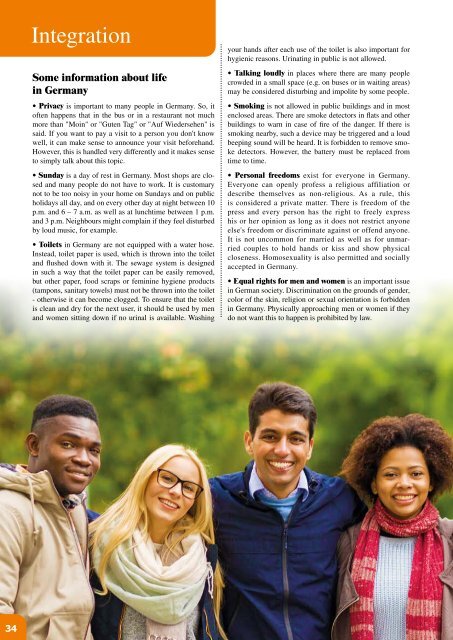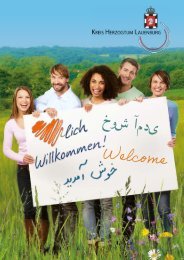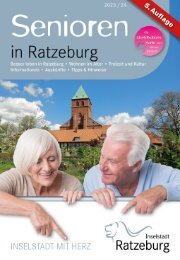Kreis Herzogtum Lauenburg - Willkommen- ukrainisch, russisch
Create successful ePaper yourself
Turn your PDF publications into a flip-book with our unique Google optimized e-Paper software.
Integration<br />
Some information about life<br />
in Germany<br />
• Privacy is important to many people in Germany. So, it<br />
often happens that in the bus or in a restaurant not much<br />
more than "Moin" or "Guten Tag" or "Auf Wiedersehen" is<br />
said. If you want to pay a visit to a person you don't know<br />
well, it can make sense to announce your visit beforehand.<br />
However, this is handled very differently and it makes sense<br />
to simply talk about this topic.<br />
• Sunday is a day of rest in Germany. Most shops are closed<br />
and many people do not have to work. It is customary<br />
not to be too noisy in your home on Sundays and on public<br />
holidays all day, and on every other day at night between 10<br />
p.m. and 6 – 7 a.m. as well as at lunchtime between 1 p.m.<br />
and 3 p.m. Neighbours might complain if they feel disturbed<br />
by loud music, for example.<br />
• Toilets in Germany are not equipped with a water hose.<br />
Instead, toilet paper is used, which is thrown into the toilet<br />
and flushed down with it. The sewage system is designed<br />
in such a way that the toilet paper can be easily removed,<br />
but other paper, food scraps or feminine hygiene products<br />
(tampons, sanitary towels) must not be thrown into the toilet<br />
- otherwise it can become clogged. To ensure that the toilet<br />
is clean and dry for the next user, it should be used by men<br />
and women sitting down if no urinal is available. Washing<br />
your hands after each use of the toilet is also important for<br />
hygienic reasons. Urinating in public is not allowed.<br />
• Talking loudly in places where there are many people<br />
crowded in a small space (e.g. on buses or in waiting areas)<br />
may be considered disturbing and impolite by some people.<br />
• Smoking is not allowed in public buildings and in most<br />
enclosed areas. There are smoke detectors in flats and other<br />
buildings to warn in case of fire of the danger. If there is<br />
smoking nearby, such a device may be triggered and a loud<br />
beeping sound will be heard. It is forbidden to remove smoke<br />
detectors. However, the battery must be replaced from<br />
time to time.<br />
• Personal freedoms exist for everyone in Germany.<br />
Everyone can openly profess a religious affiliation or<br />
describe themselves as non-religious. As a rule, this<br />
is considered a private matter. There is freedom of the<br />
press and every person has the right to freely express<br />
his or her opinion as long as it does not restrict anyone<br />
else's freedom or discriminate against or offend anyone.<br />
It is not uncommon for married as well as for unmarried<br />
couples to hold hands or kiss and show physical<br />
closeness. Homosexuality is also permitted and socially<br />
accepted in Germany.<br />
• Equal rights for men and women is an important issue<br />
in German society. Discrimination on the grounds of gender,<br />
color of the skin, religion or sexual orientation is forbidden<br />
in Germany. Physically approaching men or women if they<br />
do not want this to happen is prohibited by law.<br />
• Greeting people (men and women alike) you do not<br />
know well usually takes the form of shaking hands. Among<br />
friends (men and women), however, it is often customary to<br />
hug each other. Kissing on the cheeks can also sometimes<br />
be observed in Germany, but this is rather rare between men<br />
who are friends.<br />
• Punctuality is very much appreciated by many people<br />
in Germany. It is considered impolite to keep someone waiting<br />
and to be late for an appointment without calling and<br />
informing about this in time. This is true in private life and<br />
especially at work.<br />
• Saying “no” is not unusual in Germany. People often say<br />
directly what they think and usually do not mean it in a bad<br />
way. Rather, constructive criticism is appreciated usually.<br />
Saying first "yes" - out of “politeness”, although you actually<br />
mean "no" - is rather unusual. So - if you can't or don't<br />
want to keep an appointment, people may be annoyed if you<br />
agree to come and then do not show up.<br />
Some general information<br />
• Tap water is usually drinking water and can be drunk<br />
without hesitation.<br />
• Time change: In Germany, the clock is adjusted by one<br />
hour twice a year. “Summer time” – i.e. daylight saving time<br />
begins on the last Sunday in March and ends on the last<br />
Sunday in October when winter time begins.<br />
• Handling documents: Keep all important documents<br />
and letters sorted by subject and issue and have them recorded<br />
in files.<br />
• Doorstep transactions: Do not conclude any transactions<br />
in your home and don´t let anyone in whom you do<br />
not know and who has no authority to come in. There are<br />
people who take ad-vantage of the fact that you do not (yet)<br />
speak German well and that you are a newcomer in Germany<br />
in order to get your money. Do not sign anything that<br />
you don´t understand properly.<br />
You must allow, however, members of the staff of the Social<br />
Security Office the access to your flat if it has been<br />
rented through the Social Security Office. However, you<br />
should ask them to show you their identity card. This also<br />
applies to police officers.<br />
Work<br />
Whether you are allowed to work, and on what conditions<br />
depends on your residence status and the corresponding legal<br />
provisions.<br />
If you are holder of a residence permit, you are generally<br />
allowed without any restrictions to take up an employment.<br />
The Job Centre and the Employment Agency will support<br />
you in finding a job and, if necessary, in obtaining further<br />
qualifications or professional re-training.<br />
Advice: Register as a "job seeker" at the Employment<br />
Agency and take advantage of the career counseling offered<br />
there.<br />
34<br />
35














